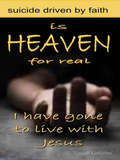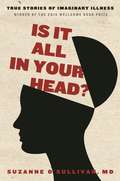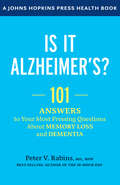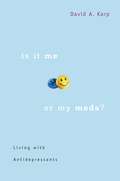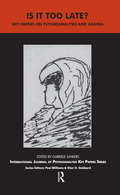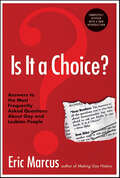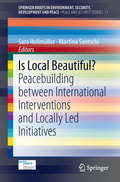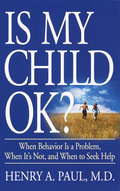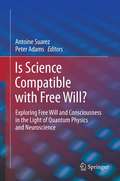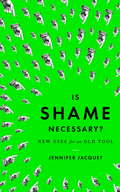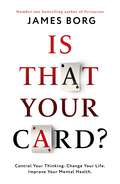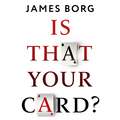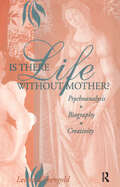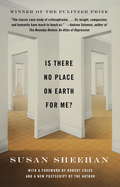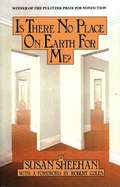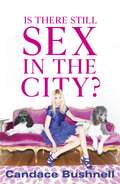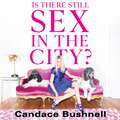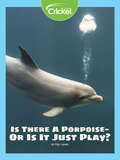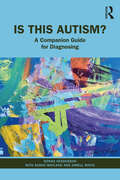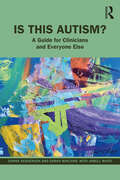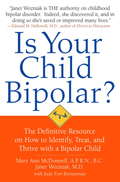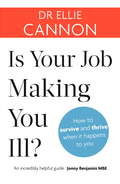- Table View
- List View
Is Heaven for Real: Suicide Driven by Faith
by Lucien Gregoire"A chilling exposé of youth suicide driven by faith." Tony Frost, Tribune Child and teen suicide is no stranger to this author: "I recall gazing at the stillness of my childhood friend in a coffin and the nun telling me that God had taken him back because he had been made of sin. He had killed himself because word got out that he had been born out of wedlock. Then there was that girl in my high school class who took the easy way out when she found herself with child. A few months after I released my biography of John Paul I, a gay teen called me and told me that my book had saved his life. He had planned to take his life on that day because his faith condemned the person he happened to be. During my years with the Children’s Home and Hospital School, I’ve shared in the grief left in the wake of children’s notes: "I have gone to live with Jesus." Thousands of mentally and physically impaired among countless others have left the same legacy behind. Then we have tragedies like Fátima, where two little children are saints today because their faith encouraged them to advance their deaths in slow and agonizing ways to suffer and die for sins of the flesh against the Immaculate Heart of Mary… and a Catholic world that thinks it wonderful. "While through the years the preacher’s hatred has taken its greatest toll in unwed mothers, gay and transgender teens, and other outcasts of religion, his lure of ‘heaven’ remains the leading cause of pre-puberty suicide today. "As for Fátima, I give you much more than the Vatican’s beatification investigation which found these children tortured themselves with abrasive ropes and stinging nettles and abstained from drinking water on hot days... "As for me, I must live out my days haunted by children’s lives snuffed out by the preacher’s irresponsible bluff, because I had not acted sooner. Thousands of tiny coffins lowered into the ground so that the preacher can sell his condominiums in the sky to sheep who lust for more." Lucien Gregoire Though the author dismantles traditional concepts of ‘heaven’ as peddled by preachers, he leaves us with far greater opportunity as he proves the salvation tenet of the 33-Day Pope: “Don’t knock yourself out over smart monkeys and Adam and Eve. Each of us is responsible for our own evolution. We can either choose to remain as mortal men, or we can evolve as Gods.”
Is It All in Your Head?
by Suzanne O'SullivanA neurologist's insightful and compassionate look into the misunderstood world of psychosomatic disorders, told through individual case histories It's happened to all of us: our cheeks flush red when we say the wrong thing, or our hearts skip a beat when a certain someone walks by. But few of us realize how much more dramatic and extreme our bodies' reactions to emotions can be. Many people who see their doctor have medically unexplained symptoms, and in the vast majority of these cases, a psychosomatic cause is suspected. And yet, the diagnosis of a psychosomatic disorder can make a patient feel dismissed as a hypochondriac, a faker, or just plain crazy. In IS IT ALL IN YOUR HEAD? neurologist Suzanne O'Sullivan, MD, takes us on a journey through the world of psychosomatic illness, where we meet patients such as Rachel, a promising young dancer now housebound by chronic fatigue syndrome, and Mary, whose memory loss may be her mind's way of protecting her from remembering her husband's abuse. O'Sullivan reveals the hidden stresses behind their mysterious symptoms, approaching a sensitive topic with patience and understanding. She addresses the taboos surrounding psychosomatic disorders, teaching us that "it's all in your head" doesn't mean that something isn't real, as the body is often the stand-in for the mind when the latter doesn't possess the tools to put words to its sorrow. She encourages us to look with compassion at the ways in which our brains act out, and to question our failure to credit the intimate connection between mind and body.
Is It Alzheimer's?: 101 Answers to Your Most Pressing Questions about Memory Loss and Dementia (A Johns Hopkins Press Health Book)
by Peter V. RabinsA medical expert answers your common questions about memory loss, causes of dementia, diagnosis, prevention, treatment, and more.Perhaps someone in your family has been diagnosed with Alzheimer disease—or maybe you worry about developing memory loss yourself. In Is It Alzheimer's?, Dr. Peter V. Rabins, a top expert in the field, educates readers by answering 101 often-asked questions about memory loss and dementia.Written in a conversational, easy-to-use Q&A style, the book is organized into seven unique sections. A companion to the best-selling The 36-Hour Day, which Dr. Rabins coauthored, this book discusses• how to distinguish typical memory loss from early dementia• how dementia is diagnosed• what factors play a role in the progression of dementia• whether it's possible to lower your risk of developing Alzheimer disease or dementia• how to improve the quality of life of people with dementia• how to assess long-term care facilities and nursing homes• available treatments, including medication• how to explain the symptoms of Alzheimer disease and dementia to others• how to provide caregivers with psychological and emotional support• and much moreAimed at friends and family members of the estimated 5.1 million US adults with dementia, as well as adults who are concerned about developing dementia, the book offers helpful directions and comfort. Is It Alzheimer's? is a quick, accessible, and essential reference for anyone who hopes to navigate the confusion of dementing illnesses.
Is It Me or My Meds: Living with Antidepressants
by David A. KarpThis book gives voice to those who are depressed and to those who use medications so that they are not depressed. Full of useful information.
Is It Me or My Meds?: Living with Antidepressants
by David A. KarpBy the millennium Americans were spending more than 12 billion dollars yearly on antidepressant medications. Currently, millions of people in the U.S. routinely use these pills. Are these miracle drugs, quickly curing depression? Or is their popularity a sign that we now inappropriately redefine normal life problems as diseases? Are they prescribed too often or too seldom? How do they affect self-images? David Karp approaches these questions from the inside, having suffered from clinical depression for most of his adult life. In this book he explores the relationship between pills and personhood by listening to a group of experts who rarely get the chance to speak on the matter--those who are taking the medications. Their voices, extracted from interviews Karp conducted, color the pages with their experiences and reactions--humor, gratitude, frustration, hope, and puzzlement. Here, the patients themselves articulate their impressions of what drugs do to them and for them. They reflect on difficult issues, such as the process of becoming committed to medication, quandaries about personal authenticity, and relations with family and friends. The stories are honest and vivid, from a distraught teenager who shuns antidepressants while regularly using street drugs to a woman who still yearns for a spiritual solution to depression even after telling intimates "I'm on Prozac and it's saving me." The book provides unflinching portraits of people attempting to make sense of a process far more complex and mysterious than doctors or pharmaceutical companies generally admit.
Is It Too Late?: Key Papers on Psychoanalysis and Ageing (The IJPA Key Papers Series)
by Gabriele JunkersThis book brings together a selection of classic psychoanalytical papers related to ageing, dying and death that have appeared in the renowned International Journal of Psychoanalysis (IJP). Two papers address the analysis of an elderly patient directly and bring the work and the challenges it brings vividly to life. Also explored are such issues as death and the midlife crisis, loneliness and the ageing process, ageing and psychopathology, fear of death, transference and countertransference issues, and the final stage of the dying process. 'The idea behind this monograph is to alert interested psychoanalysts, students and those working from an interdisciplinary standpoint to the possibility of a better understanding of the ageing process as well as a group of potential analysis that seem to exist in the shadow of our professional communications. 'Each stage of life has its own somatic and psychic normality as well as pathology.
Is It a Choice?: Answers to Three Hundred of the Most Frequently Asked Questions About Gay and Lesbian People
by Eric MarcusThe answers to all the questions you've ever had about sexual orientation but were afraid to ask. Eric Marcus provides insightful, no-nonsense answers to hundreds of the most commonly asked questions about same-sex orientation. Offering frank and accepting insight on everything you've always wanted-and needed-to know about same-gender relationships, coming out, family roles, politics, and much more, including: How do you know if you're gay or lesbian?What should you do if your child is gay or lesbian?Do gay parents raise gay children?What does the Bible say about homosexuality?
Is Local Beautiful?
by Sara Hellmüller Martina SantschiBased on the swisspeace annual conference 2012, the publication examines the delicate balance between external interventions and locally-led initiatives. It addresses the question of what "local" means in the peacebuilding and development context; which actors on the ground actually represent the local level and how external actors choose their partners from amongst them. Moreover, it examines how local ownership - emerging as key criteria for any external intervention - is constituted: does this concept only imply local participation or is local control from the outset a must? Finally, it assesses the potential of locally-led initiatives and local conflict resolution mechanisms and their interaction with external interventions. Several authors provide insights on these questions and nuance our thinking about both local ownership and external interventions. As such, the publication aims to encourage critical reflections on this topical debate in peacebuilding and development.
Is My Child OK? When Behavior Is a Problem, When It's Not, and When to Seek Help
by Henry A. PaulMy kindergartner insists on wearing the same dress day after day. What should I do? My twelve-year-old is a target of the class bully. Should I intervene? My four-year-old is coming home with other kids' toys in his pocket. Should I be concerned? Is my child normal? Every parent has asked the question at one time or another. Now this wise and compassionate guide, written by an expert in children's mental health, offers reassuring words for worried parents--plus concrete ways to spot the difference between a normal stage of development... and a true problem. In most cases, childhood problems will clear up with a healthy dose of common sense and loving parental attention. But sometimes professional help or medication is needed. This one-stop reference book--organized by symptom and covering everything from tantrums to learning disorders--tells parents what's "normal," what's not, how best to help your child through a rocky period, and when to get an expert's help. Discover: How much fighting between siblings is "normal" (page 94) What to do if your child is the class bully--or the victim of a bully (page 89) How to determine if your child has ADD--or if he's just a little more active and a little less patient (page 106) Tough questions parents must ask themselves when they're dealing with chronic separation anxiety (page 37) How to help a child who suddenly refuses to go to school (page 124) The growing concern surrounding childhood eating disorders (page 172) And much more.
Is Science Compatible with Free Will?
by Antoine Suarez Peter AdamsAnyone who claims the right 'to choose how to live their life' excludes any purely deterministic description of their brain in terms of genes, chemicals or environmental influences. For example, when an author of a text expresses his thoughts, he assumes that, in typing the text, he governs the firing of the neurons in his brain and the movement of his fingers through the exercise of his own free will: what he writes is not completely pre-determined at the beginning of the universe. Yet in the field of neuroscience today, determinism dominates. There is a conflict between the daily life conviction that a human being has free will, and deterministic neuroscience. When faced with this conflict two alternative positions are possible: Either human freedom is an illusion, or deterministic neuroscience is not the last word on the brain and will eventually be superseded by a neuroscience that admits processes not completely determined by the past. This book investigates whether it is possible to have a science in which there is room for human freedom. The book generally concludes that the world and the brain are governed to some extent by non-material agencies, and limited consciousness does not abolish free will and responsibility. The authors present perspectives coming from different disciplines (Neuroscience, Quantumphysics and Philosophy) and range from those focusing on the scientific background, to those highlighting rather more a philosophical analysis. However, all chapters share a common characteristic: they take current scientific observations and data as a basis from which to draw philosophical implications. It is these features that make this volume unique, an exceptional interdisciplinary approach combining scientific strength and philosophical profundity. We are convinced that it will strongly stimulate the debate and contribute to new insights in the mind-brain relationship.
Is Shame Necessary?
by Jennifer JacquetAn urgent, illuminating exploration of the social nature of shame and of how it might be used to promote large-scale political change and social reform. In cultures that champion the individual, guilt is advertised as the cornerstone of conscience. But while guilt holds individuals to personal standards, it is powerless in the face of corrupt institutions. In recent years, we as consumers have sought to assuage our guilt about flawed social and environmental practices and policies by, for example, buying organic foods or fair-trade products. Unless nearly everyone participates, however, the impact of individual consumer consciousness is ineffective. Is Shame Necessary? presents us with a trenchant case for public shaming as a nonviolent form of resistance that can challenge corporations and even governments to change policies and behaviors that are detrimental to the environment. Jennifer Jacquet argues that public shaming, when it has been retrofitted for the age of social media and aimed in the proper direction, can help compensate for the limitations of guilt in a globalized world. Jacquet leaves us with a new understanding of how public shame, when applied in the right way and at the right time, has the capacity to keep us from failing other species in life's fabric and, ultimately, from failing ourselves.From the Hardcover edition.
Is That Your Card?: Control Your Thinking. Change Your Life. Improve Your Mental Health.
by James BorgLearn how to control your perceptions and emotions, minimise dysfunctional thinking and achieve greater success in life.We're all dealt certain 'cards' in life, the daily challenges we need to overcome in order to thrive. Tackling the problems and challenges of everyday life begins with our thinking. Our thoughts and behaviours can propel us forward or sabotage our goals and relationships. This practical, eye-opening book draws on the philosophy of the ancient Stoics and the ground-breaking therapy of Dr Albert Ellis to help you achieve your goals.Is That Your Card? will help you change your mindset for the better, putting you in position to propel yourself to greater success. You will learn simple techniques to right the ship when harmful, negative thoughts take over because it is our beliefs that decide how we look at a situation. The act of thinking will never be the same as you become more aware of your emotions, gain more confidence and self-esteem, improve your relationships and look at anxiety and anger in a completely different way.Just remember: don't believe everything you think.'A guide to help us back on the path to good mental health and wellbeing' - Dr Sian Williams, counselling psychologist and BBC broadcasterPraise for Persuasion'This book is spot-on and should be a must-read' - Daily Telegraph'A rare "self-help" book - marvellously readable and fun. Hugely to be recommended' - Jilly CooperPraise for Mind Power'The best of the current self-help books' - The Guardian
Is That Your Card?: Control Your Thinking. Change Your Life. Improve Your Mental Health.
by James BorgLearn how to control your perceptions and emotions, minimise dysfunctional thinking and achieve greater success in life.We're all dealt certain 'cards' in life, the daily challenges we need to overcome in order to thrive. Tackling the problems and challenges of everyday life begins with our thinking. Our thoughts and behaviours can propel us forward or sabotage our goals and relationships. This practical, eye-opening book draws on the philosophy of the ancient Stoics and the ground-breaking therapy of Dr Albert Ellis to help you achieve your goals.Is That Your Card? will help you change your mindset for the better, putting you in position to propel yourself to greater success. You will learn simple techniques to right the ship when harmful, negative thoughts take over because it is our beliefs that decide how we look at a situation. The act of thinking will never be the same as you become more aware of your emotions, gain more confidence and self-esteem, improve your relationships and look at anxiety and anger in a completely different way.Just remember: don't believe everything you think.'A guide to help us back on the path to good mental health and wellbeing' - Dr Sian Williams, counselling psychologist and BBC broadcasterPraise for Persuasion'This book is spot-on and should be a must-read' - Daily Telegraph'A rare "self-help" book - marvellously readable and fun. Hugely to be recommended' - Jilly CooperPraise for Mind Power'The best of the current self-help books' - The Guardian
Is That Your Card?: Control Your Thinking. Change Your Life. Improve Your Mental Health.
by James BorgLearn how to control your perceptions and emotions, minimise dysfunctional thinking and achieve greater success in life.We're all dealt certain 'cards' in life, the daily challenges we need to overcome in order to thrive. Tackling the problems and challenges of everyday life begins with our thinking. Our thoughts and behaviours can propel us forward or sabotage our goals and relationships. This practical, eye-opening book draws on the philosophy of the ancient Stoics and the ground-breaking therapy of Dr Albert Ellis to help you achieve your goals.Is That Your Card? will help you change your mindset for the better, putting you in position to propel yourself to greater success. You will learn simple techniques to right the ship when harmful, negative thoughts take over because it is our beliefs that decide how we look at a situation. The act of thinking will never be the same as you become more aware of your emotions, gain more confidence and self-esteem, improve your relationships and look at anxiety and anger in a completely different way.Just remember: don't believe everything you think.'A guide to help us back on the path to good mental health and wellbeing' - Dr Sian Williams, counselling psychologist and BBC broadcasterPraise for Persuasion'This book is spot-on and should be a must-read' - Daily Telegraph'A rare "self-help" book - marvellously readable and fun. Hugely to be recommended' - Jilly CooperPraise for Mind Power'The best of the current self-help books' - The Guardian
Is There Life Without Mother?: Psychoanalysis, Biography, Creativity
by Leonard ShengoldIn this richly textured study of personal growth and creativity hemmed in by childhood disaster, Shengold compares the differing gifts and differing solutions of extraordinary talents as they seek to negotiate a universal longing to refind the mother without sliding back into neglect, abuse, and despair. In the foreground of his analysis are moving portraits of Jules Renard and Anthony Trollope and the densely packed traumatic legacy of their respective childhoods, the one limned in sustained psychological torture, the other framed by neglect and abandonment. Long acknowledged as a master of the literary-biographic genre within psychoanalysis, Shengold does not view the study of creative individuals as the occasion to make pontifical pronouncements about the nature of creativity. Rather, he sees such study as affording the opportunity to borrow from genius, insofar as the gifted writer who is psychologically astute often captures the challenges of life and the nuances of suffering in language that "ordinary" patients would use, if only they could. By integrating literary analysis with biographical data, Shengold arrives at an appealingly direct, demystified approach to great literature as a vehicle for apprehending the intricacies of enduring psychological dilemmas. For the solutions of truly creative individuals not only reflect an artistic temperament wed to extraordinarily gifts; they illuminate the solutions we are all in search of. Elegantly sparing in language and judicious in presenting source material, Is There Life Without Mother? is abundantly generous in the wealth of understanding it provides and the deeper reflection it provokes. From the subtleties of identification as a means of consolidating identity in the face of neglect to the return of the traumatic as a fate that even a writer's "literary revenge" cannot circumvent, this work takes the reader deeper into the wellsprings of personality change than that it is usually possible to go.
Is There No Place on Earth for Me
by Robert Coles Susan SheehanThis renowned journalist's classic Pulitzer Prize winning investigation of schizophrenia--now reissued with a new postscript--follows a flamboyant and fiercely intelligent young woman as she struggles in the throes of mental illness."Sylvia Frumkin" was born in 1948 and began showing signs of schizophrenia in her teens. She spent the next seventeen years in and out of mental institutions. In 1978, reporter Susan Sheehan took an interest in her and, for more than two years, became immersed in her life: talking with her, listening to her monologues, sitting in on consultations with doctors--even, for a period, sleeping in the bed next to her in a psychiatric center. With Sheehan, we become witness to Sylvia's plight: her psychotic episodes, the medical struggle to control her symptoms, and the overburdened hospitals that, more often than not, she was obliged to call home. The resulting book, first published in 1982, was hailed as an extraordinary achievement: harrowing, humanizing, moving, and bitingly funny. Now, some two decades later, Is There No Place on Earth for Me? continues to set the standard for accounts of mental illness.
Is There No Place on Earth for Me?
by Susan SheehanSylvia Frumkin a highly intelligent young girl became a schizophrenic in her late teens and spent most of the next seventeen years in and out of mental institutions. Susan Sheehan followed Sylvia for almost a year, talking with and observing her.
Is There Still Sex in the City?
by Candace BushnellCandace Bushnell gets personal in her new memoir - an investigation into what happens when a woman of a certain age (ok, let's call it 'middle') finds herself not-so-young, free and single in the city.MILFs, cougars, love, sex, divorce - Candace's brilliantly funny and honest first-person account lays bare the truth behind middle-aged romance. Among other revelations we read her Modern Day Cougar Compendium, including guidance on such important matters as the Unexpected Cub Pounce (sometimes the cub does the pouncing); what to do when your age-appropriate date asks you to pay for his kitchen renovation, and the Pluses and Minuses of Being Older and Wiser.
Is There Still Sex in the City?
by Candace BushnellCandace Bushnell gets personal in her new memoir - an investigation into what happens when a woman of a certain age (ok, let's call it 'middle') finds herself not-so-young, free and single in the city.MILFs, cougars, love, sex, divorce - Candace's brilliantly funny and honest first-person account lays bare the truth behind middle-aged romance. Among other revelations we read her Modern Day Cougar Compendium, including guidance on such important matters as the Unexpected Cub Pounce (sometimes the cub does the pouncing); what to do when your age-appropriate date asks you to pay for his kitchen renovation, and the Pluses and Minuses of Being Older and Wiser.
Is There a "Porpoise"—Or Is It Just Play?
by Peg LopataAs dolphins flip, whirling through blue waters and creating bubbles with their dorsal fins, scientists study if this playful act is fun and not just instinctual behavior, or as some marine psychologists believe, that porpoises practice hunting skills. Enjoy discovering what dolphins learn through playing games like “keep away” in our oceans and freshwater rivers!
Is This Autism?: A Companion Guide for Diagnosing
by Donna Henderson Sarah Wayland Jamell WhiteThis companion guide to Is This Autism? A Guide for Clinicians and Everyone Else shows clinicians how to assess for the possibility of autism in clients of all ages. Understanding of autism has greatly expanded in recent years, and many clinicians feel ill-equipped or confused about how to incorporate this knowledge into their diagnostic process. As a result, countless unidentified autistic people do not have reasonable access to proper identification or support. This book describes current assessment methods, including interviewing, rating scales, self-report measures, social cognition tests, and behavioral observations. It also provides guidance regarding cultural considerations, common mistakes, and how to communicate with and support clients through the diagnostic process. This very practical clinical guide provides a clear and neurodiversity-affirmative approach to autism assessment, particularly for autistic individuals who have previously been missed. It is relevant to all healthcare professionals who want to learn how to identify autism in their clients.
Is This Autism?: A Guide for Clinicians and Everyone Else
by Donna Henderson Sarah Wayland Jamell WhiteThough our understanding of autism has greatly expanded, many autistic individuals are still missed or misdiagnosed. This highly accessible book clarifies many ways that autism can present, particularly in people who camouflage to hide their autistic traits. The authors take the reader step by step through the diagnostic criteria, incorporating the latest research as well as quotes from over 100 autistic contributors that bring that research to life. They also describe many aspects of autism that are not included in the current diagnostic criteria, such as autistic strengths and co-occurring disorders. Readers will learn about highly relevant topics, such as different types of empathy, sensory systems that are not well known, neuro-crash and burn out, and relative versus absolute thinking. This book provides a deep, current, and neurodiversity-affirmative understanding of the less obvious presentations of autism. It is relevant to all healthcare professionals, educators, family members, autistic individuals, and anyone who is curious about autism. A clinical companion guide, Is This Autism? A Companion Guide for Diagnosing, is available for clinicians who make mental health diagnoses.
Is Your Child Bipolar? The Definitive Resource on How to Identify, Treat, and Thrive with a Bipolar Child
by Mary Ann Mcdonnell Janet Wozniak Judy Fort BrennemanDesigned as a definitive resource on how to identify bipolar disorders in children, this book also focuses of effective treatments and resources available to parents today. McDonnell, who head her own non-profit organization supporting bipolar children, and Wozniak (Harvard Medical School) offer practical information on how to cope with bipolar children and teens and communicate concerns effectively to doctors, teachers and counselors. A section is included on how to properly diagnose a bipolar disorder, and how not to confuse this condition with other types of personality disorders. Annotation ©2008 Book News, Inc. , Portland, OR (booknews. com)
Is Your Job Making You Ill?: How to survive and thrive when it happens to you
by Dr Ellie Cannon'An incredibly helpful guide' Jonny Benjamin MBE'Groundbreaking . . . so relatable given the current way we approach our work' Amy Wall, Woman's WayWhat happens when the effects of work are far more detrimental to your wellbeing than a simple case of Sunday-night blues?Whether you're suffering from work-induced high blood pressure, depression, migraines, or panic attacks, Dr Ellie Cannon has the answer - and it's not quitting your job.We all have a moan about going to work: groaning about getting on the bus in the rush hour, counting down to the weekend. A gripe here and there is understandable and expected, but what happens when your job is making you mentally or physically unwell?When you are in this situation, it can be very difficult to know where to turn, who to speak to or where to find good quality help and advice. In Is Your Job Making You Ill?, Dr Ellie Cannon uses her decade of experience treating patients to create an essential resource for anybody suffering from job-related ill-health.Part one of the book lays out the key causes of job-related illness - from the pressure of an unmanageable workload to the challenges of an emotionally-draining job - and identifies the most common illnesses and symptoms which can occur as a result, including stress, anxiety, insomnia, high blood pressure and IBS.Part two will help you to find a way out. It includes a practical, self-directed programme that can be tailored to your individual circumstances, covering everything from where to find help, when (and if) to seek professional advice or take time off work, to micro-actions like improving your commute and adjusting your diet to support a healthy lifestyle.Work-related ill health can happen to anyone. This book is all about how to survive and thrive when it happens to you. Don't let your job rule your life anymore.
Is Your Job Making You Ill?: How to survive and thrive when it happens to you
by Ellie Cannon'An incredibly helpful guide' Jonny Benjamin MBE'Groundbreaking . . . so relatable given the current way we approach our work' Amy Wall, Woman's WayWhat happens when the effects of work are far more detrimental to your wellbeing than a simple case of Sunday-night blues?Whether you're suffering from work-induced high blood pressure, depression, migraines, or panic attacks, Dr Ellie Cannon has the answer - and it's not quitting your job.We all have a moan about going to work: groaning about getting on the bus in the rush hour, counting down to the weekend. A gripe here and there is understandable and expected, but what happens when your job is making you mentally or physically unwell?When you are in this situation, it can be very difficult to know where to turn, who to speak to or where to find good quality help and advice. In Is Your Job Making You Ill?, Dr Ellie Cannon uses her decade of experience treating patients to create an essential resource for anybody suffering from job-related ill-health.Part one of the book lays out the key causes of job-related illness - from the pressure of an unmanageable workload to the challenges of an emotionally-draining job - and identifies the most common illnesses and symptoms which can occur as a result, including stress, anxiety, insomnia, high blood pressure and IBS.Part two will help you to find a way out. It includes a practical, self-directed programme that can be tailored to your individual circumstances, covering everything from where to find help, when (and if) to seek professional advice or take time off work, to micro-actions like improving your commute and adjusting your diet to support a healthy lifestyle.Work-related ill health can happen to anyone. This book is all about how to survive and thrive when it happens to you. Don't let your job rule your life anymore.
